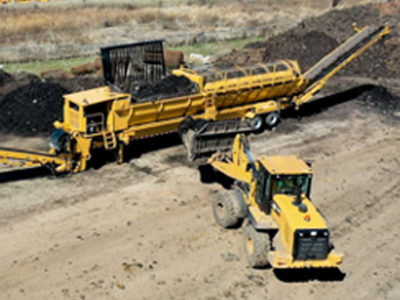When people think about innovative companies, typically one person within those organizations comes to mind:
- Thomas Edison
- Sheryl Sandberg
- Henry Ford
- Arianna Huffington
- Steve Jobs
- Oprah Winfrey
- Bill Gates
- Daymond John
- Elon Musk
While those individuals certainly deserve the credit that comes along with being forward-thinking individuals, the idea of one person being responsible for innovation is a myth. These great innovators didn’t execute on their ideas alone. It took a team with a culture founded on innovation to revolutionize the industry. If you read Part 1: Understanding the need for innovation and want to turn your composting organization into one that thrives, establishing the right company culture is the key to unlocking innovation.
Collective genius
When you look collectively across your entire operations, what are your expectations for your team? Do you want them to just do a job, or do you want them invested in the company’s output and growth?
The answer to that question can speak volumes about an organization’s internal culture. Invested employees who feel part of where the organization is today and responsible for helping it continue to grow can fuel innovation. A culture of “show-up and simply do your job” will likely produce the opposite results. Innovative leaders are lifted up by an innovative team. Harnessing the collective genius of your organization will fuel innovations well beyond what any one individual or leadership team can accomplish.
Fostering innovation
To establish an innovative culture in your company, you need to start by empowering your team. Empowered employees share ideas and feel comfortable debating processes and ideas with their superiors in a positive way. Empowering your people also means allowing them to research and explore ideas they believe can help the organization grow and better meet the needs of your customers.
Keep in mind, empowerment isn’t a one-day workshop. It’s process that takes a long time to build into your organization’s culture. Your next big idea isn’t likely going to come from a brainstorming session during a planning meeting; it’s more than likely going to come from the break room over a cup of coffee.
Celebrate wins (and losses)
If you want your team to keep bringing you ideas, you need to recognize those efforts regularly. Employees need to see that you value their input, whether their idea saved the company in operating expenses, expanded your customer base, or resulted in failure. Not every idea will lead to success. Also, there is a good chance a good idea won’t be a perfect solution the first time you implement it. Instead, it will likely take several iterations of an idea before it becomes a widespread success.
The team at Vermeer understands that failure is part of success. When Gary Vermeer was testing a prototype of the first Vermeer stump cutter back in 1953, the operator hit the wrong lever, causing the wheel to cut in an unintended direction. The mistake cut five times faster and took the development team in a brand new direction. It’s this spirit of learning from failure that has continued to drive design innovation for decades.
Of course, creating a way to remove stumps more efficiently isn’t where the Vermeer story ends. Vermeer has a long track record of creating new equipment and technology for the industries the company serves. The path to building and maintaining a successful organization will typically follow a similar path. How do you think your team would describe your culture today? What steps do you need to make to create an innovative culture?
Up next
What is innovative today is a commodity tomorrow. Establishing an innovative culture requires challenging your team regularly, seeking out the next ideas and understanding which ones are worth pursuing. Part 3 of the Creating Innovation in Your Composting Business series will cover more on that subject.
Commentary provided by: Ted Dirkx
Ted Dirkx is an applications specialist for Recycling and Forestry at Vermeer Corporation. After studying composting and graduating with a degree in environmental studies from Central College, he joined equipment manufacturer Vermeer Corporation in Pella, Iowa. Traveling about 30 weeks a year, he has been roaming North America and beyond, helping organizations set up compost facilities, manufacture mulch, clear land and produce biofuels. As he interacts with operations, he is a curious learner of all things that make their operations successful. He has presented at the Compost Council of Canada Conference, Canadian Wood Waste Recycling Association, Biocycle Conference and United States Composting Council Conference on topics related to operational efficiency and maintenance.
Vermeer Corporation reserves the right to make changes in product engineering, design and specifications; add improvements; or discontinue manufacturing or distribution at any time without notice or obligation. Equipment shown is for illustrative purposes only and may display optional accessories or components specific to their global region. Please contact your local Vermeer dealer for more information on machine specifications.
Vermeer and the Vermeer logo are trademarks of Vermeer Manufacturing Company in the U.S. and/or other countries.
